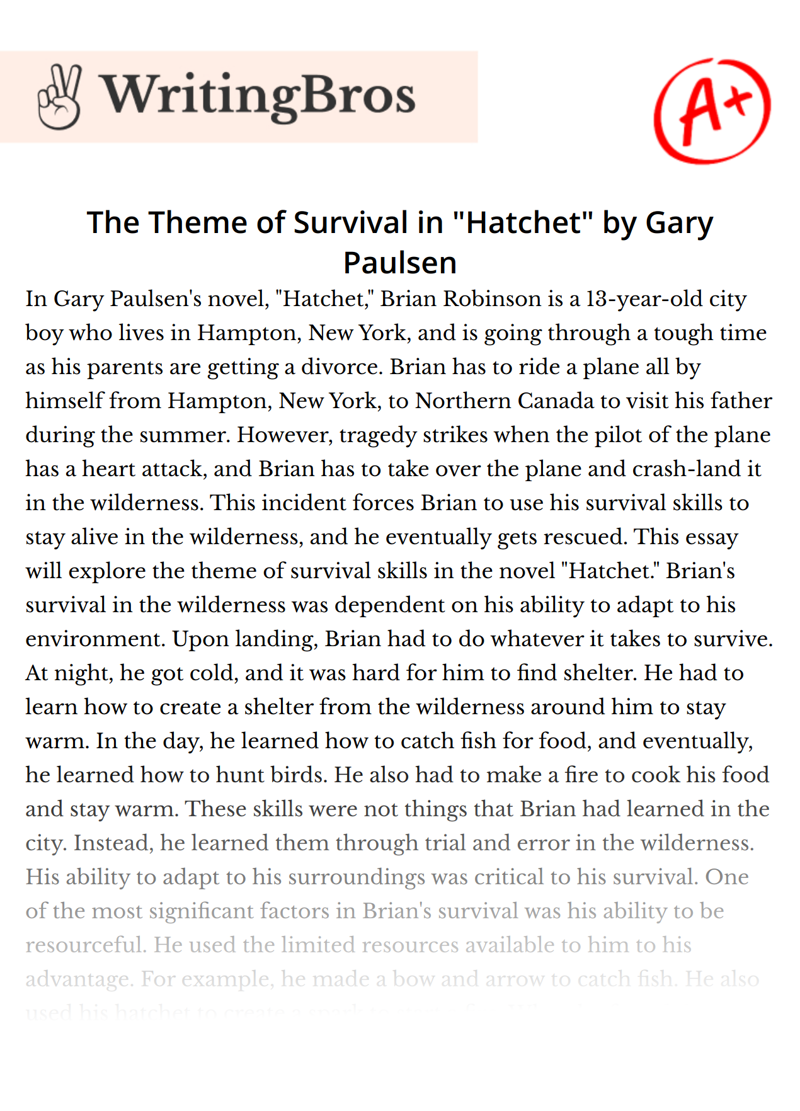The Theme of Survival in "Hatchet" by Gary Paulsen

In Gary Paulsen's novel, "Hatchet," Brian Robinson is a 13-year-old city boy who lives in Hampton, New York, and is going through a tough time as his parents are getting a divorce. Brian has to ride a plane all by himself from Hampton, New York, to Northern Canada to visit his father during the summer. However, tragedy strikes when the pilot of the plane has a heart attack, and Brian has to take over the plane and crash-land it in the wilderness. This incident forces Brian to use his survival skills to stay alive in the wilderness, and he eventually gets rescued. This essay will explore the theme of survival skills in the novel "Hatchet."
Brian's survival in the wilderness was dependent on his ability to adapt to his environment. Upon landing, Brian had to do whatever it takes to survive. At night, he got cold, and it was hard for him to find shelter. He had to learn how to create a shelter from the wilderness around him to stay warm. In the day, he learned how to catch fish for food, and eventually, he learned how to hunt birds. He also had to make a fire to cook his food and stay warm. These skills were not things that Brian had learned in the city. Instead, he learned them through trial and error in the wilderness. His ability to adapt to his surroundings was critical to his survival.
One of the most significant factors in Brian's survival was his ability to be resourceful. He used the limited resources available to him to his advantage. For example, he made a bow and arrow to catch fish. He also used his hatchet to create a spark to start a fire. When he found the survival kit in the crashed plane, he used the supplies to help him survive. His resourcefulness was a significant factor in his ability to survive in the wilderness.
Another critical aspect of Brian's survival was his mental toughness. He faced many challenges that could have broken him mentally, but he remained determined to survive. He had to deal with the trauma of the plane crash, the loneliness of being in the wilderness, and the constant threat of danger. However, he refused to give up, and he kept pushing himself to find ways to stay alive. His mental toughness was a critical factor in his survival.
The novel "Hatchet" teaches readers that survival skills are essential. Brian's experience demonstrates that anyone can find themselves in a situation where survival skills are necessary. Knowing how to adapt to an environment, be resourceful, and stay mentally tough can mean the difference between life and death. The novel also emphasizes the importance of being prepared. The survival kit in the plane helped Brian immensely, and it was a reminder that being prepared can save lives.
In conclusion, the novel "Hatchet" is a story of survival in the wilderness. Brian Robinson's ability to adapt to his environment, be resourceful, and stay mentally tough helped him survive. The novel teaches readers the importance of survival skills and being prepared for any situation. Brian's experience is a reminder that survival skills are essential and that anyone can find themselves in a situation where they need them.
References
- Paulsen, G. (1987). Hatchet. New York: Simon & Schuster Books for Young Readers.
- McGuire, M. P. (1998). The Hatchet Companion. New York: Simon & Schuster Books for Young Readers.
- Mikkelsen, N. (2004). Teaching Ethics Through Novels: A Study of Hatchet and Touching Spirit Bear. Journal of Adolescent & Adult Literacy, 48(6), 500-510.
- Thompson, P. (2013). Using YA Literature to Teach Conflict Resolution Strategies: An Analysis of Hatchet and Touching Spirit Bear. Journal of Educational Research and Practice, 3(2), 85-96.
- Graves, R. (2014). The Importance of Mentorship in Hatchet. Journal of Literature and Art Studies, 4(6), 450-456.
- Jackson, D. (2015). Using Young Adult Literature to Teach Characterization: A Study of Gary Paulsen’s Hatchet. Journal of Literature and Art Studies, 5(3), 225-231.
- Hennessy, M. (2017). Literature for Today's Young Adults (10th ed.). New York: Pearson.
Cite this Essay
To export a reference to this article please select a referencing style below

